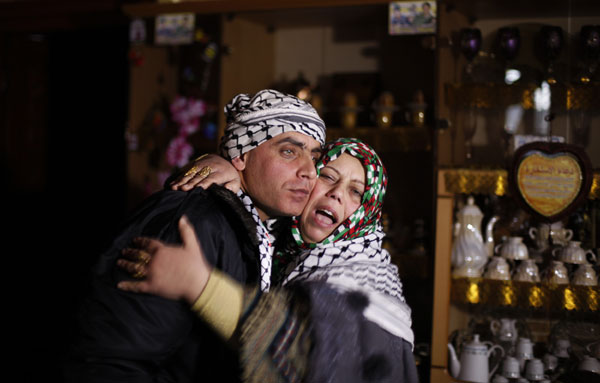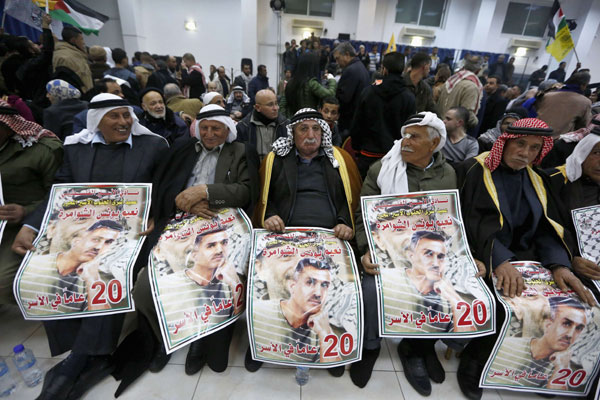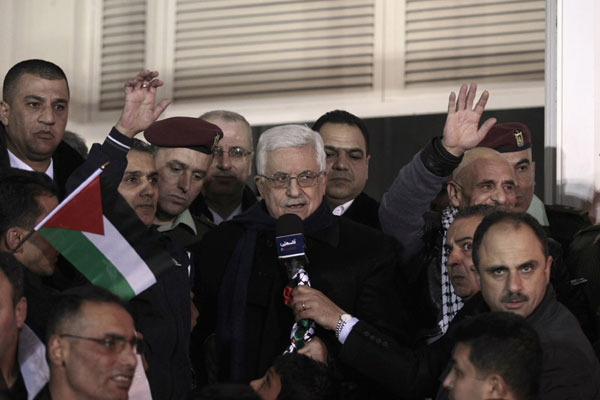Israel released more than two dozen Palestinian prisoners convicted in deadly attacks against Israelis early on Tuesday as part of a US-brokered package to restart Mideast peace talks.
|
 |
|
Freed Palestinian prisoner Rami Barbakh, who was held by Israel for 20 years, is hugged by his mother at his house in Khan Younis, in the southern Gaza Strip December 31, 2013. [Photo/Agencies] |
After departing on buses from Israeli jails overnight, the 26 prisoners received a hero's welcome upon their return to the West Bank and Gaza with officials and jubilant relatives lining up to greet them.
At his headquarters in Ramallah, Palestinian President Mahmoud Abbas waited to meet the men in the middle of the night. Speaking before thousands, he pledged to continue pressing for the release of even long-serving and ill prisoners.
"We will not sign a final peace deal with Israel before all the prisoners are released," he said.
Hours before the release, dozens of Israelis marched toward the East Jerusalem home of one of the prisoners, carrying black umbrellas and holding pictures of those killed or wounded in attacks.
 |
|
Palestinians hold posters depicting Palestinian prisoner Naim Shawamreh as they wait for the released prisoners to arrive to the West Bank city of Ramallah. [Photo/Agencies] |
In an apparent attempt to blunt the criticism for the release, Netanyahu is expected to approve plans to build 1,400 new homes in both the West Bank and East Jerusalem in the coming days.
The Palestinians say such construction undermines peace efforts and have appealed to the US to block the expected announcement. The US and the European Union have harshly criticized settlement announcements during the current round of negotiations, and US Secretary of State John Kerry at one point questioned Israel's commitment to peace.
But Netanyahu indicated he would not back down. His decision to press forward with settlement construction has drawn widespread criticism.
Amir Peretz, a Cabinet minister with the dovish "Movement" party, said the painful site of watching convicted killers walk free could have been avoided had Netanyahu agreed to freeze settlement construction.
Settler leader Dani Dayan, on the other hand, said the timing of a new settlement announcement looked bad. "The linkage between the release of convicted terrorists and the construction in Jerusalem and in Judea and Samaria puts an unnecessary stain on the construction," he said.
In another move that could upset peace efforts, a committee of Israeli Cabinet ministers approved a bill on Sunday that would annex a section of the West Bank near the Jordanian border to Israel.
Netanyahu has said Israel must maintain a presence in the area, known as the Jordan Valley, as a security measure. Even so, it appears unlikely the bill, supported by hard-line lawmakers unhappy with peace efforts, will receive parliamentary approval.
Speaking in Ramallah, Abbas rejected the move. "This is Palestinian land and we will not let them do it," he said.
 |
|
Palestinian President Mahmoud Abbas (C) speaks as he welcomes Palestinian prisoners released by Israel, in the West Bank city of Ramallah early December 31, 2013. [Photo/Agencies] |
Under a formula drawn up by Kerry, Israel agreed last summer to release 104 long-serving Palestinian prisoners in order to restart peace talks with the Palestinians.
In exchange, the Palestinians dropped their longstanding demand for Israel to halt construction of homes in the West Bank and East Jerusalem, areas captured by Israel in 1967 that they claim for their future state. The Palestinians say they have received vague assurances that Israel would show restraint while the talks continue until an April target date for an agreement.
The latest prisoner release is the third of four planned stages. The release was carried out by Israel overnight to avoid the larger spectacle of having to witness the celebrations over the killers' freedom.
All 26 of the men have been convicted in deadly attacks, and have spent between 19 and 28 years in prison. They included 18 men from the West Bank, three Gazans, and in a concession by Israel, five men from East Jerusalem.
|
|
|
|
|
|
|
|
